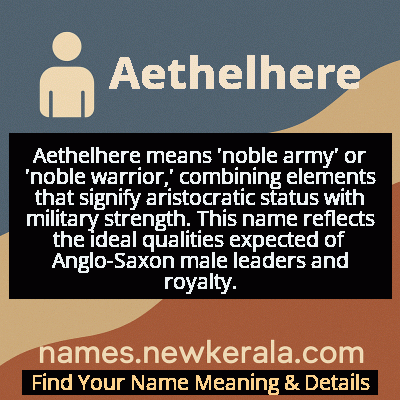Aethelhere Name Meaning & Details
Origin, Popularity, Numerology Analysis & Name Meaning of Aethelhere
Discover the origin, meaning, and cultural significance of the name AETHELHERE. Delve into its historical roots and explore the lasting impact it has had on communities and traditions.
Name
Aethelhere
Gender
Male
Origin
Anglo
Lucky Number
6
Meaning of the Name - Aethelhere
Aethelhere means 'noble army' or 'noble warrior,' combining elements that signify aristocratic status with military strength. This name reflects the ideal qualities expected of Anglo-Saxon male leaders and royalty.
Aethelhere - Complete Numerology Analysis
Your Numerology Number
Based on Pythagorean Numerology System
Ruling Planet
Venus
Positive Nature
Harmonious, responsible, caring, and artistic.
Negative Traits
Overly idealistic, superficial, possessive, or jealous.
Lucky Colours
Pink, turquoise.
Lucky Days
Friday.
Lucky Stones
Diamond, turquoise.
Harmony Numbers
2, 3, 9.
Best Suited Professions
Artists, musicians, teachers, healthcare workers.
What People Like About You
Warmth, nurturing nature, artistic flair.
Famous People Named Aethelhere
Æthelhere of East Anglia
King
Ruled East Anglia and died at the Battle of the Winwaed fighting for Penda of Mercia
Æthelhere the Thegn
Nobleman
Recorded in the Liber Vitae of Durham as a significant Anglo-Saxon landowner
Æthelhere of Kent
Royal Official
Witness to several royal charters during the reign of King Æthelberht of Kent
Name Variations & International Equivalents
Click on blue names to explore their detailed meanings. Gray names with will be available soon.
Cultural & Historical Significance
The name embodies the warrior-king ideal of early English monarchy, where military leadership and noble lineage were inseparable qualities expected of rulers. As part of the Wuffingas dynasty, Æthelhere's name and legacy connect to the foundational myths and historical narratives of East Anglia's formation. The survival of his name in historical records like Bede's Ecclesiastical History demonstrates its importance in understanding the transition from pagan to Christian England and the complex alliances that shaped early English kingdoms.
Extended Personality Analysis
Individuals named Aethelhere are typically perceived as possessing strong leadership qualities, natural authority, and a sense of noble responsibility. They often exhibit strategic thinking and military-minded approaches to problem-solving, reflecting the name's 'army' component. These individuals tend to be protective of their communities and families, showing loyalty and commitment to those they lead or serve. The 'noble' aspect of the name suggests someone with high moral standards, dignity, and a sense of honor that guides their decisions.
They may be traditional in their values yet innovative in their methods, combining respect for heritage with practical solutions to contemporary challenges. Their personality often blends aristocratic bearing with practical warrior spirit, making them both respected and effective in positions of responsibility. The historical weight of the name tends to influence personality development toward seriousness, historical consciousness, and a sense of carrying forward ancient traditions. These individuals often feel a connection to history and may develop interests in genealogy, military history, or leadership roles that allow them to exercise both strategic thinking and moral authority.
Modern Usage & Popularity
Aethelhere is extremely rare in modern times, primarily used by historical reenactors, scholars of Anglo-Saxon history, or parents seeking unique names with deep historical roots. It appears occasionally in genealogical research and historical fiction but has never ranked in official baby name statistics. The name's complexity and archaic spelling make it challenging for contemporary use, though simplified versions like 'Ethelhere' might be more accessible. Its usage is largely confined to academic circles, historical societies, and families with strong interest in their Anglo-Saxon heritage. The name represents a niche choice for those valuing historical authenticity over modern convenience, and its appearance in modern contexts almost always signals deliberate engagement with early medieval history rather than following naming trends.
Symbolic & Spiritual Meanings
Aethelhere symbolizes the ideal of noble leadership combined with protective strength. The name represents the concept of aristocracy not as privilege but as responsibility—the noble bearing the duty to lead and protect their people. Symbolically, it connects to themes of heritage, tradition, and the warrior-protector archetype. The combination of 'noble' and 'army' suggests someone who wields power with honor and uses strength for communal benefit rather than personal gain. In metaphorical terms, Aethelhere embodies the balance between civilized authority and necessary force, representing the ideal ruler who maintains order through both moral example and practical capability. The name carries connotations of ancient wisdom, historical continuity, and the enduring values of leadership and protection that transcend specific historical periods to speak to universal human ideals of governance and community service.

